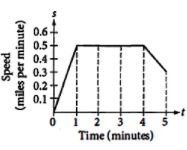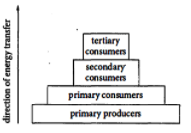Question

Note: Figure not drawn to scale.
In the figure above, sin(90° - x0) =  . What is the value of sin x0 ?
. What is the value of sin x0 ?
The correct answer is: 
Sin (90 - x) 




Related Questions to study

The graph above models the speed, s, of an automobile during the first 5 minutes of travel time, t. What was the total distance traveled from t=1 to t=4?

The graph above models the speed, s, of an automobile during the first 5 minutes of travel time, t. What was the total distance traveled from t=1 to t=4?
The energy pyramid below shows four trophic levels in an ecosystem and the direction of energy transfer between those levels.

On average, 10% of the net energy of one trophic level is transferred to the next trophic level in an ecosystem. Based on the energy pyramid, if primary producers have 5,000 joules (J) of energy, approximately how much of this energy, in calories, is transferred to the secondary consumers in this ecosystem? (1 calorie= 4.18 J)
Energy flow direction within an ecosystem
1. An ecosystem's energy flow is always unidirectional.
2. It is said to be unidirectional because energy is lost in heat when moving from one trophic level to the next to maintain an organism's homeostasis.
3. As a result, each successive trophic level receives less energy than the previous trophic level.
4. Some energy is lost as heat when an organism moves from one trophic level to the next to maintain homeostasis.
5. As a result, each successive trophic level receives less energy than the previous trophic level.
6. Because the sun is the only energy source for all ecosystems on Earth, the energy flow in the food chain is unidirectional.
7. The energy captured by autotrophs does not return to the sun.
8. As a result, energy flows through various trophic levels in a food chain.
9. Energy comes from the sun and is consumed by producers in most natural ecosystems.
10. It is then passed down through the trophic levels as food.
11. As a result, energy flows from the prey to the predator rather than the other way around.
The energy pyramid below shows four trophic levels in an ecosystem and the direction of energy transfer between those levels.

On average, 10% of the net energy of one trophic level is transferred to the next trophic level in an ecosystem. Based on the energy pyramid, if primary producers have 5,000 joules (J) of energy, approximately how much of this energy, in calories, is transferred to the secondary consumers in this ecosystem? (1 calorie= 4.18 J)
Energy flow direction within an ecosystem
1. An ecosystem's energy flow is always unidirectional.
2. It is said to be unidirectional because energy is lost in heat when moving from one trophic level to the next to maintain an organism's homeostasis.
3. As a result, each successive trophic level receives less energy than the previous trophic level.
4. Some energy is lost as heat when an organism moves from one trophic level to the next to maintain homeostasis.
5. As a result, each successive trophic level receives less energy than the previous trophic level.
6. Because the sun is the only energy source for all ecosystems on Earth, the energy flow in the food chain is unidirectional.
7. The energy captured by autotrophs does not return to the sun.
8. As a result, energy flows through various trophic levels in a food chain.
9. Energy comes from the sun and is consumed by producers in most natural ecosystems.
10. It is then passed down through the trophic levels as food.
11. As a result, energy flows from the prey to the predator rather than the other way around.
A sample of 600 ninth graders was selected at random and asked how much time they spend on homework each day. Of the ninth graders selected, 220 spend less than 2 hours on homework each day. If the conclusion was drawn that "approximately 1.35 million ninth graders spend less than 2 hours on homework each day," which of the following is closest to the population, in millions, of ninth graders?
A sample of 600 ninth graders was selected at random and asked how much time they spend on homework each day. Of the ninth graders selected, 220 spend less than 2 hours on homework each day. If the conclusion was drawn that "approximately 1.35 million ninth graders spend less than 2 hours on homework each day," which of the following is closest to the population, in millions, of ninth graders?
(2x - 1)(x+ 2)2 = 0
What is the solution set to the equation above?
(2x - 1)(x+ 2)2 = 0
What is the solution set to the equation above?
f(x) = x(x + 5)
The function f is defined above. If the function g is defined by g(x) = f(x) + 5, what is the value of g(3) ?
f(x) = x(x + 5)
The function f is defined above. If the function g is defined by g(x) = f(x) + 5, what is the value of g(3) ?
If 2x+ 3 = x - 4, what is the value of x + 8 ?
If 2x+ 3 = x - 4, what is the value of x + 8 ?
Which of the following is a solution to the equation  ?
?
I. -2
II. 1
III. 5
Which of the following is a solution to the equation  ?
?
I. -2
II. 1
III. 5
Radioactive substances decay over time. The mass M, in grams, of a particular radioactive substance d days after the beginning of an experiment is shown in the table below.
|
Number of days, d |
Mass, M (grams) |
|
0 |
120.00 |
|
30 |
103.21 |
|
60 |
88.78 |
|
90 |
76.36 |
Radioactive substances decay over time. The mass M, in grams, of a particular radioactive substance d days after the beginning of an experiment is shown in the table below.
|
Number of days, d |
Mass, M (grams) |
|
0 |
120.00 |
|
30 |
103.21 |
|
60 |
88.78 |
|
90 |
76.36 |
The table below shows the number of lakes in the United Kingdom classified by alkalinity and depth.
|
Depth class |
Alkalinity Class |
|||
|
Low |
Medium |
High |
Total |
|
| Shallow |
87 |
61 |
209 |
357 |
| Moderate |
227 |
86 |
110 |
423 |
| Deep |
130 |
35 |
21 |
186 |
| Total |
444 |
182 |
340 |
966 |
The table below shows the number of lakes in the United Kingdom classified by alkalinity and depth.
|
Depth class |
Alkalinity Class |
|||
|
Low |
Medium |
High |
Total |
|
| Shallow |
87 |
61 |
209 |
357 |
| Moderate |
227 |
86 |
110 |
423 |
| Deep |
130 |
35 |
21 |
186 |
| Total |
444 |
182 |
340 |
966 |





